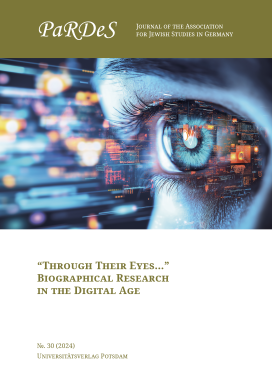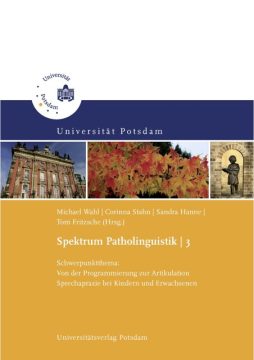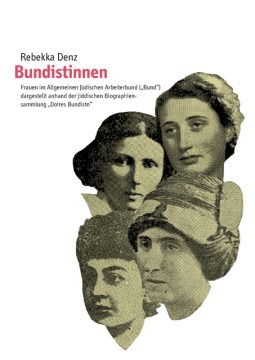Biographical studies have always been central to the field of history, but the relevance of biographical research seems to have increased in recent years, calling for a deeper analytical study and a critical re-evaluation of the newly developing “biographical turn.” Especially in an increasingly digitized world, including in academia, life stories seem to offer new perspectives through which personal narratives, cultural phenomena, or literary works can be examined, understood, and presented. Furthermore, these sources raise new questions about the interests and perspectives of the author(s), the reliability and subjectivity of the individual, as well as the constructiveness and authenticity of associated texts and sources.
While these questions might be universal, they are inherent in Jewish history and culture. The worldwide spread of digitization offers answers to some of these questions, but also leads to new demands and difficulties in the study of biographies. Therefore, in the digital age, biographical research is a complex but promising method for expanding knowledge about phenomena such as Jewish (forced) migration, the Holocaust, the development of diasporas, exiles, and transnational networks, but also questions of acculturation, representation, remembrance, and the formation of memory.
Björn Siegel , Andrea Sinn, Oskar Czendze, Jay H. Geller, Margarete Myers Feinstein , Nils Roemer , Sylwia Papier , Tabea Henn , Gerald Lamprecht, Marco Jandl , Andreas Heusler, Maximilian Strnad , Renate Evers , Seth Bernstein , Richard I. Cohen , Elena Hoffenberg , Morgan Morales, Avner Ofrath , Thomas Varkonyi, Anastasiia Strakhova
ISBN: 978-3-86956-591-0
232 pages, Paperback
Release year 2025
Series: PaRDeS : Zeitschrift der Vereinigung für Jüdische Studien e.V. , 30
16,50 €
Non-taxable transaction according to § 1 (1) UStG/VAT Act in combination with § 2 (3) UStG/VAT Act a. F. Providing this service, the University of Potsdam does not constitute a Betrieb gewerblicher Art/Commercial Institution according to § 1 (1) No. 6 or § 4 KStG/Corporate Tax Act. If the legal characterization of our business is changed to a commercial institution subsequently, we reserve the right to invoice VAT additionally. zzgl. Versandkosten
Biographical studies have always been central to the field of history, but the relevance of biographical research seems to have increased in recent years, calling for a deeper analytical study and a critical re-evaluation of the newly developing “biographical turn.” Especially in an increasingly digitized world, including in academia, life stories seem to offer new perspectives through which personal narratives, cultural phenomena, or literary works can be examined, understood, and presented. Furthermore, these sources raise new questions about the interests and perspectives of the author(s), the reliability and subjectivity of the individual, as well as the constructiveness and authenticity of associated texts and sources.
While these questions might be universal, they are inherent in Jewish history and culture. The worldwide spread of digitization offers answers to some of these questions, but also leads to new demands and difficulties in the study of biographies. Therefore, in the digital age, biographical research is a complex but promising method for expanding knowledge about phenomena such as Jewish (forced) migration, the Holocaust, the development of diasporas, exiles, and transnational networks, but also questions of acculturation, representation, remembrance, and the formation of memory.
Recommended Books
-
 2010
2010Sandra Hanne, Corinna Stahn, Michael Wahl, Tom Fritzsche, Judith Heide
Schwerpunktthema: Von der Programmierung zur Artikulation
7,50 €Non-taxable transaction according to § 1 (1) UStG/VAT Act in combination with § 2 (3) UStG/VAT Act a. F. Providing this service, the University of Potsdam does not constitute a Betrieb gewerblicher Art/Commercial Institution according to § 1 (1) No. 6 or § 4 KStG/Corporate Tax Act. If the legal characterization of our business is changed to a commercial institution subsequently, we reserve the right to invoice VAT additionally.
zzgl. Versandkosten
Add to cart -
 2008
2008Jüdische Delinquenten in der Frühen Neuzeit
10,00 €Non-taxable transaction according to § 1 (1) UStG/VAT Act in combination with § 2 (3) UStG/VAT Act a. F. Providing this service, the University of Potsdam does not constitute a Betrieb gewerblicher Art/Commercial Institution according to § 1 (1) No. 6 or § 4 KStG/Corporate Tax Act. If the legal characterization of our business is changed to a commercial institution subsequently, we reserve the right to invoice VAT additionally.
zzgl. Versandkosten
Add to cart -
 2015
2015Genisa-Blätter I
10,50 €Non-taxable transaction according to § 1 (1) UStG/VAT Act in combination with § 2 (3) UStG/VAT Act a. F. Providing this service, the University of Potsdam does not constitute a Betrieb gewerblicher Art/Commercial Institution according to § 1 (1) No. 6 or § 4 KStG/Corporate Tax Act. If the legal characterization of our business is changed to a commercial institution subsequently, we reserve the right to invoice VAT additionally.
zzgl. Versandkosten
Add to cart -
 2009
2009Bundistinnen
10,00 €Non-taxable transaction according to § 1 (1) UStG/VAT Act in combination with § 2 (3) UStG/VAT Act a. F. Providing this service, the University of Potsdam does not constitute a Betrieb gewerblicher Art/Commercial Institution according to § 1 (1) No. 6 or § 4 KStG/Corporate Tax Act. If the legal characterization of our business is changed to a commercial institution subsequently, we reserve the right to invoice VAT additionally.
zzgl. Versandkosten
Add to cart
Contact
Potsdam University Library
University Press
Am Neuen Palais 10
14476 Potsdam
Germany
verlag@uni-potsdam.de
0331 977-2094
0331 977-2292





